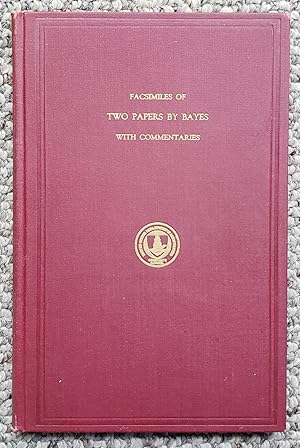BAYES, THOMAS 1702 1761 (2 resultados)
Tipo de artículo
- Todo tipo de artículos
- Libros (2)
- Revistas y publicaciones
- Cómics
- Partituras
- Arte, grabados y pósters
- Fotografías
- Mapas
-
Manuscritos y
coleccionismo de papel
Condición
- Todo
- Nuevos
- Antiguos o usados
Encuadernación
- Todo
- Tapa dura
- Tapa blanda
Más atributos
- Primera edición
- Firmado
- Sobrecubierta
- Con imágenes del vendedor (1)
- Sin impresión bajo demanda
Ubicación del vendedor
Valoración de los vendedores
-
Facsimiles of Two Papers by Bayes. i. An Essay Towards Solving a Problem in the Doctrine of Chances, with Richard Price's Foreword and Discussion; . with a Commentary by Edward C. Molina. ii. A Letter on Asymptotic Series from Bayes to John Canton; .
Publicado por New York & London: Hafner, 1963., 1963
Librería: Ted Kottler, Bookseller, Redondo Beach, CA, Estados Unidos de America
Original o primera edición
Hardcover. Condición: Very Good. No Jacket. 1st Edition. Facsimile Reprint of original 1940 edition. Frontispiece (Facsimile of title page of Phil. Trans., Vol. LIII, 1763, pub. 1764, in which the papers originally appeared), xii + Facsimile Reprints [pp. 370-418; 269-271]. Original cloth. Very Good. Pp. vii-xii = Molina's Commentary. Pp. iii-iv = W. Edwards Deming's Commentary on the Letter. '. . . the first attempt to establish foundations for statistical inference. . . . The striking feature of Bayes's work is an argument found in a scholium to the paper, which does not follow from any standard axioms. Suppose we have no information about the prior probability of a statistical hypothesis. Bayes argues by analogy that, in this case, our ignorance is neither more nor less than in his example where prior probabilities are known to be entirely uniform. He concludes, 'I shall take for granted that the rule concerning the event M . . . is also the rule to be used in relation to any event concerning the probability of which nothing at all is known antecedently to any trials made or observed concerning it.' If Bayes's conclusion is correct, we have a basis for the whole of statistical inference. Richard Price, who sent Bayes's paper to the Royal Society, seems to imply in a covering letter that Bayes was not satisfied with his argument by analogy and, hence, had declined to publish it. Whatever the case with Bayes, Laplace had no qualms about Bayes's argument; and from 1774 he regularly assumed uniform prior probability distributions. His enormous influence made Bayes's ideas almost unchallengable until George Boole protested in his Laws of Thought (1854). Since then, Bayes's technique has been a constant subject of controversy' (Ian Hacking in D.S.B. I: 531-2). A Google search for 'Bayesian' produces 11.9 million listings.
-
Facsimiles of Two Papers by Bayes. i. An Essay Towards Solving a Problem in the Doctrine of Chances, with Richard Price's Foreword and Discussion; . with a Commentary by Edward C. Molina. ii. A Letter on Asymptotic Series from Bayes to John Canton; .
Publicado por Washington, D.C.: Graduate School, Department of Agriculture, 1940., 1940
Librería: Ted Kottler, Bookseller, Redondo Beach, CA, Estados Unidos de America
Libro Original o primera edición
Hardcover. Condición: Very Good. No Jacket. 1st Edition. Frontispiece (Facsimile of title page of Phil. Trans., Vol. LIII, 1763, pub. 1764, in which the papers originally appeared), xii + Facsimile Reprints [pp. 370-418; 269-271]. Original cloth. Very Good. Pp. vii-xii = Molina's Commentary. Pp. iii-iv = W. Edwards Deming's Commentary on the Letter. '. . . the first attempt to establish foundations for statistical inference. . . . The striking feature of Bayes's work is an argument found in a scholium to the paper, which does not follow from any standard axioms. Suppose we have no information about the prior probability of a statistical hypothesis. Bayes argues by analogy that, in this case, our ignorance is neither more nor less than in his example where prior probabilities are known to be entirely uniform. He concludes, 'I shall take for granted that the rule concerning the event M . . . is also the rule to be used in relation to any event concerning the probability of which nothing at all is known antecedently to any trials made or observed concerning it.' If Bayes's conclusion is correct, we have a basis for the whole of statistical inference. Richard Price, who sent Bayes's paper to the Royal Society, seems to imply in a covering letter that Bayes was not satisfied with his argument by analogy and, hence, had declined to publish it. Whatever the case with Bayes, Laplace had no qualms about Bayes's argument; and from 1774 he regularly assumed uniform prior probability distributions. His enormous influence made Bayes's ideas almost unchallengable until George Boole protested in his Laws of Thought (1854). Since then, Bayes's technique has been a constant subject of controversy' (Ian Hacking in D.S.B. I: 531-2). A Google search for 'Bayesian' produces 11.9 million listings. [a.c.].



